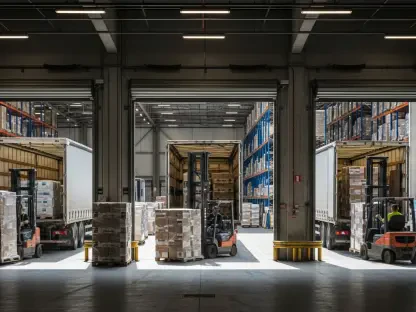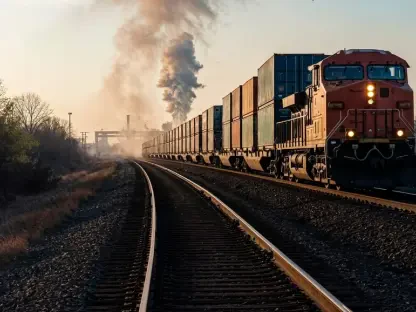The Orient Overseas Container Line (OOCL) recently named “OOCL Portugal,” the twelfth and final vessel in its 24,188 TEU series. This landmark event is not just significant for OOCL but for the entire maritime industry. It represents a crucial step forward in eco-friendly, efficient maritime transportation. This article delves into the various aspects of this milestone, examining how it aligns with broader industry trends.
The Significance of the 24,188 TEU Series
Advancement in Maritime Engineering
The 24,188 TEU series stands as a testament to the latest advancements in maritime engineering. These mega vessels are designed to handle more cargo than ever before, accommodating the growing global trade demands. The engineering behind these vessels focuses on maximizing capacity while ensuring operational efficiency. With improved hull designs, advanced propulsion systems, and state-of-the-art navigation technologies, these ships can traverse vast distances more efficiently.
Moreover, these vessels are engineered to offer optimal performance in diverse maritime conditions, from bustling ports to challenging open seas. Such versatility is essential as shipping routes become increasingly complex and diversified. These vessels showcase how modern engineering can meet the logistical challenges posed by global trade, adapting to regional diversities and pushing the envelope in terms of technological innovation.
Eco-Friendly Designs
One of the standout features of the 24,188 TEU series is its commitment to eco-friendliness. As global attention shifts towards sustainable practices, these vessels are designed to comply with the latest environmental regulations. These ships utilize advanced technologies to reduce emissions and enhance energy efficiency. Features like high-efficiency engines, hull designs that minimize drag, and systems that mitigate underwater noise contribute to a lower carbon footprint.
In addition, these eco-friendly designs play a pivotal role in reducing overall operational costs. The efficient usage of fuel and adherence to environmental standards translates to long-term savings, making it a win-win for both the company and the planet. By committing to these sustainable innovations, OOCL not only enhances its operational capabilities but also aligns with a global push towards greener and more responsible shipping practices.
OOCL’s Strategic Global Operations
Extensive Global Network
OOCL’s extensive global network is another factor reinforcing its leadership in the industry. With about 130 offices across more than 100 major cities, OOCL links crucial economic zones across continents. This global reach is not just about connectivity but also about reliability. The strategic positioning of OOCL’s offices and hubs ensures seamless coordination of operations, from Asia to Europe and the Americas.
Moreover, the integration of cutting-edge IT systems enables real-time tracking of shipments, enhancing transparency and customer satisfaction. This robust infrastructure supports the efficient movement of goods, key to maintaining global supply chains. By investing in technological solutions and extensive networks, OOCL demonstrates its ability to meet the dynamic needs of international trade.
Strengthening Trade Routes
OOCL’s fleet, including the new 24,188 TEU vessels, plays a crucial role in strengthening global trade routes. These mega vessels are integral to major trade lanes, facilitating the efficient movement of large volumes of goods. With increased capacity, these vessels can consolidate shipments, reducing the number of voyages required and thus contributing to lower freight rates. This efficiency is crucial in balancing supply and demand dynamics in global trade.
Additionally, the presence of these vessels in major trade lanes underscores the importance of continuous investment in maritime infrastructure. Ports and terminals need to keep up with the scaling sizes of vessels to accommodate efficient loading and unloading operations. The broader impact of such investments is significant, as they enable smoother and more reliable global trade flows.
Trends Towards Larger, More Efficient Vessels
Consolidation in the Maritime Industry
A prominent trend in the maritime industry is consolidation, driven by the need for efficiency and cost-effectiveness. Larger vessels like OOCL’s 24,188 TEU series epitomize this trend, allowing companies to transport more goods per voyage. Consolidation also leads to reduced competition in certain routes, enabling shipping companies to optimize their service offerings. With fewer but larger players, the industry can better manage capacity and pricing, benefiting both carriers and customers.
Moreover, the shift towards larger vessels necessitates comprehensive network planning. Shipping companies need to ensure that their larger ships can be integrated seamlessly into existing trade lanes without causing disruptions. The strategic and operational adjustments required for such integrations are a clear indication of how the industry is evolving to meet modern trade demands.
Emphasis on Operational Efficiency
Operational efficiency is a key driver behind the design and deployment of larger vessels. Modern mega vessels are equipped with technologies that optimize fuel consumption, navigation, and cargo handling. These efficiencies are not just limited to vessel operations but extend to port interactions as well. Automated systems for docking, loading, and unloading streamline port activities, reducing turnaround times.
Furthermore, operational efficiency is essential in mitigating risks associated with delays and disruptions. Advanced planning and real-time data analytics enable shipping companies to navigate unforeseen challenges, ensuring timely delivery of goods. Given the complexities of modern global trade, these efficiencies are pivotal in sustaining the industry’s growth and reliability.
Commitment to Environmental Stewardship
Adherence to Environmental Regulations
Adhering to environmental regulations is no longer an option but a necessity in the maritime industry. The 24,188 TEU series is designed with a strong emphasis on meeting, if not exceeding, these regulations. The use of low-sulfur fuels, energy-efficient engines, and advanced emission control systems ensures compliance with international standards such as the IMO’s 2020 sulfur cap. These measures significantly reduce the environmental impact of shipping operations.
Additionally, the incorporation of ballast water treatment systems prevents the transfer of invasive marine species, addressing ecological concerns. This holistic approach to environmental stewardship underscores the industry’s commitment to preserving marine ecosystems. By prioritizing these measures, OOCL aligns with global sustainability goals, enhancing its reputation as an environmentally conscious leader.
Long-Term Sustainability Goals
OOCL’s move reflects broader industry trends geared towards sustainability and efficiency. The advent of “OOCL Portugal” is part of a larger strategy to reduce the environmental impact of shipping while enhancing performance and reliability. These modern vessels are designed to consume less fuel and emit fewer pollutants, contributing to global efforts to combat climate change. Furthermore, this new class of ships showcases advances in shipping technology, including state-of-the-art navigation and cargo management systems.
Overall, the introduction of “OOCL Portugal” is a remarkable achievement, heralding a future where shipping is more sustainable, efficient, and aligned with global environmental goals.









